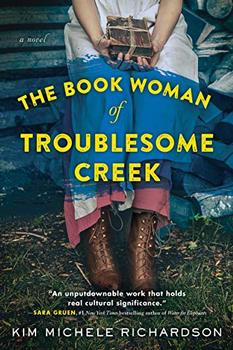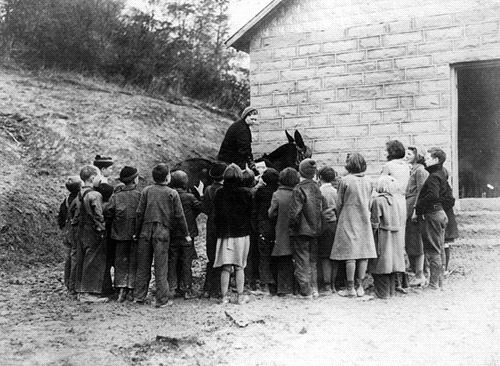Summary | Excerpt | Reading Guide | Discuss | Reviews | Beyond the Book | Read-Alikes | Genres & Themes | Author Bio

A Novel
by Kim Michele RichardsonThis article relates to The Book Woman of Troublesome Creek
 The WPA (Works Progress Administration) established the Pack Horse Library Project in Eastern Kentucky during the Great Depression. The program, which was championed by First Lady Eleanor Roosevelt, employed librarians who delivered books and other reading materials to patrons on horseback, working to both create employment and improve literacy in the remote area. The Pack Horse Library Project ran from the mid-1930s through 1943.
The WPA (Works Progress Administration) established the Pack Horse Library Project in Eastern Kentucky during the Great Depression. The program, which was championed by First Lady Eleanor Roosevelt, employed librarians who delivered books and other reading materials to patrons on horseback, working to both create employment and improve literacy in the remote area. The Pack Horse Library Project ran from the mid-1930s through 1943.
Eastern Kentucky had been hit hard by the Depression along with other areas of the U.S., and by the early '30s was struggling with a number of additional disadvantages: It lacked the basic infrastructure and resources available elsewhere, such as adequate roads and electricity. Around one-third of the population was unable to read. Kentucky was also trailing other states in the number of library books it had in circulation. As unemployment was seriously high, there was a need for both jobs and education, but the above issues created obstacles to both. A few years later, in the midst of these trying conditions, the Pack Horse Library Project was formed.
Under the WPA program, libraries were created in places where there previously had been none, with communities setting up shop in any available buildings. From these established bases, mounted carriers rode off into the mountains with saddlebags of books for rural patrons. The carriers, who were mostly women, were paid $28 per month, or roughly the equivalent of $500 today. Aside from this salary, the program didn't provide much direct monetary support. This meant that the Pack Horse Project depended on donations of books, magazines, newspapers and other reading materials, as well as the hard work and ingenuity of the librarians to preserve them.
One of the ways in which librarians preserved and consolidated reading material was through scrapbooks. They would cut out content worth saving from old books or publications and put them in binders, creating reconstructed volumes that would circulate throughout and between communities. Scrapbooks might contain recipes, articles, quilt patterns and other interesting or useful information. According to Jason Vance, a librarian at Middle Tennessee State University who commented on the Kentucky Pack Horse librarians on NPR's Morning Edition, 2,582 scrapbooks were in circulation in 1940.
In addition to scrapbooks, Bibles enjoyed popularity along the Pack Horse librarians' routes. Some rural people were suspicious of the librarians, but their ability to share Bible verses with patrons sometimes smoothed the way to interest in additional reading material. In The Book Woman of Troublesome Creek, Cussy Mary, known as Book Woman on her route, frequently reads aloud to her patrons, some of whom are illiterate. In this way and others, the Pack Horse librarians played vital roles in their communities, serving as conduits to literacy, between neighbors and to the outside world. This was even more impressive considering the obstacles they faced: The mountainous terrain could present significant challenges, particularly in winter, sometimes forcing them to go on foot for portions of their routes—a dismaying prospect considering that routes typically covered at least 100 miles in a single week.
While The Book Woman of Troublesome Creek is aimed at an adult audience, the Pack Horse Library Project has also been featured in the children's book That Book Woman, and Down Cut Shin Creek: The Pack Librarians of Kentucky, a nonfiction book for middle-grade readers.
Pack horse librarian visiting a school in Kentucky
Filed under People, Eras & Events
![]() This "beyond the book article" relates to The Book Woman of Troublesome Creek. It originally ran in October 2019 and has been updated for the
May 2019 edition.
Go to magazine.
This "beyond the book article" relates to The Book Woman of Troublesome Creek. It originally ran in October 2019 and has been updated for the
May 2019 edition.
Go to magazine.
Your guide toexceptional books
BookBrowse seeks out and recommends the best in contemporary fiction and nonfiction—books that not only engage and entertain but also deepen our understanding of ourselves and the world around us.